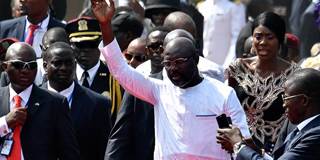In a region typically associated with coups and authoritarianism, the legacy of Liberia's outgoing president, Ellen Johnson Sirleaf, stands out. As the country's new leader settles into office, his government should commit to building upon the solid foundation that his predecessor left.
DALLAS – Last month, Liberians witnessed something remarkable: a peaceful transfer of power in their country. After 12 years in office, Ellen Johnson Sirleaf stepped down as president, and former soccer star George Weah was inaugurated. It was the first time since 1944 that one democratically elected leader voluntarily made way for another.
To be sure, one well-managed election does not a stable democracy make. But in a region often associated with coups d’état and authoritarian rule, Liberia’s progress is worthy of celebration, as it can help to lay the foundation for a better, more democratic future. As representative government in Liberia enters a new phase of maturity, it is worth reflecting on how the country got here.
In 2005, when Sirleaf was elected, Liberia was a shambles, following 25 years of civil war and dictatorship. Few predicted that Sirleaf, Africa’s first democratically elected female head of state, could set her country on a better path. But, though her tenure was not without challenges – from the Ebola crisis to endemic corruption and fiscal difficulties – she did just that.

DALLAS – Last month, Liberians witnessed something remarkable: a peaceful transfer of power in their country. After 12 years in office, Ellen Johnson Sirleaf stepped down as president, and former soccer star George Weah was inaugurated. It was the first time since 1944 that one democratically elected leader voluntarily made way for another.
To be sure, one well-managed election does not a stable democracy make. But in a region often associated with coups d’état and authoritarian rule, Liberia’s progress is worthy of celebration, as it can help to lay the foundation for a better, more democratic future. As representative government in Liberia enters a new phase of maturity, it is worth reflecting on how the country got here.
In 2005, when Sirleaf was elected, Liberia was a shambles, following 25 years of civil war and dictatorship. Few predicted that Sirleaf, Africa’s first democratically elected female head of state, could set her country on a better path. But, though her tenure was not without challenges – from the Ebola crisis to endemic corruption and fiscal difficulties – she did just that.